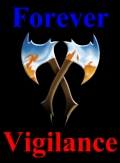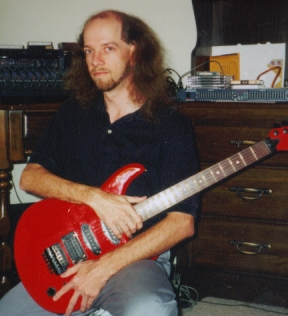"Eternal Devotion to the Dark Goddess" is the heart-warming tale of a man getting tortured to death. Sorry about that... just a little dark humor to go along with this very dark CD. Told in nine parts "Eternal Devotion to the Dark Goddess" is the story of a man's life, of his naive and hopeful beginnings, of his disillusionment and drive to succeed at all costs, and of his fall and quest for retribution. The setting is recognizable as the United States in the present day although the events described could have taken place in the echelons of power of just about any dominant world power throughout history, especially those whose ideals have become corrupted in the pursuit of empire. The protagonist's tale is a journey through a world where sadism, deceit, and exploitation lay waiting behind every shining promise. It is a tale of cut-throat capitalism, of torture and abuse of power, and of the desperate struggle to preserve love and purity in a world of lust and debauchery, but mostly it is about lies and how they are used to create and destroy.
In the first part of the opening track, "I Used to be Young", the protagonist sits in his jail cell, lamenting the loss of his youth, power, and dreams, which have given way to hatred, degradation, and death. He recounts the things that were promised him if he lived up to his end of the social contract only to discover that the promises were lies in a world rife with corruption. In the second part of the track he is brought into the torture chamber where he is softened up and prepared for interrogation by the antagonist. In the following six tracks the protagonist tells the story of his life, the truth as he sees it, and reveals the reasons for why he is where he is.
In "Masters of the Universe" the protagonist, frustrated by his inability to get ahead by doing things the "right way", forsakes his idealism and embraces the aggression, greed, and ruthlessness that characterize the successful, eventually becoming one of the most powerful men in the firm. In "My Angel" the protagonist clings to the dream of a storybook romance and struggles to make it happen, only to see the object of his desire defiled and discarded by smooth-talking liar. His experiences destroy his faith in the system and he becomes a jaded, uncaring monster. The firm however, has a place for a man like him and has him do their dirty work in "The Evil Men Do", at least until he is no longer useful.
In "Death's Angel" the protagonist finds himself in a third world hellhole, albeit loaded with money, where he indulges himself with suicidal abandon until he hits rock bottom. His ideology, capitalist-democracy has chewed him up and spit him out, but it isn't until he is kidnapped and abused by a band of "freedom fighters" that he finds something new to serve. After freeing himself and slaughtering many of his captors he rediscovers the source of his power and embraces a dark ideology of death and retribution, using the pain of a lifetime of broken promises to fuel his vengeance. In "God is Pain", the protagonist reveals how ideologies, or "gods", enslave the masses, how they are complicit in bringing about the pain which their lies are well crafted to alleviate, and how their followers come to prefer lies over truth. Being fluent in lies from his years with the firm he turns the remaining freedom fighters against the system in "Viva la Revolucion", destroying its coveted symbols of wealth and power and threatening to bring it all crashing down. In that respect he fails, however his plan was never to overthrow the system, but to provoke it into destroying itself, sacrificing himself in the process.
In "My Reflection" the antagonist's character is explored, revealing how he is a mirror image of the man whom he is interrogating. The antagonist's former ideology has failed him too, but instead of revenge he seeks to purify the system, purging it of evil and transforming it into a capitalistic theocracy. The two characters clash in the final track, "Black and Black", as do their ideologies. The protagonist sees the antagonist's beliefs as his weakness and attacks his tormentor's faith and self-image even while being interrogated and tortured. In the end the protagonist turns the tables on his nemesis, provoking his anger and softening him up for the final blow: the delivery of a simple lie, one that the antagonist deeply wants to believe.
The story ends there, with the protagonist dying, but his plan has worked. He has convinced the antagonist that a rival power is behind an insidious plot to assassinate him, take over the firm, and seize control of the state. The antagonist is also led to believe that a "package", perhaps a small nuclear device, has been smuggled into the country to be used as blackmail. The antagonist's fears and paranoia get the better of him and he is consumed by the righteous cause of defending his ideology against the forces of evil. In the name of a greater good he justifies imposing a police state, interrogating and torturing suspects, and starting "defensive" wars. Thus in the pursuit of ridding the world of evil the antagonist ends up unwittingly doing the protagonist's bidding, destroying the system which brought the protagonist so much pain. And so what was built with lies is destroyed with lies. The world is not black and white, it is black and black.


